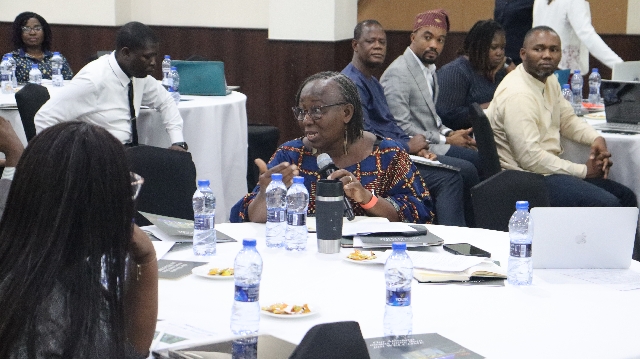Ghana must do more to raise awareness on Non-Communicable Diseases – Prof Agyepong
 Professor Irene A. Agyepong, Chair of the Faculty of Public Health at the Ghana College of Physicians and Surgeons (GCPS)
Professor Irene A. Agyepong, Chair of the Faculty of Public Health at the Ghana College of Physicians and Surgeons (GCPS)
Ghana still has significant work to do in increasing awareness and understanding of Non-Communicable Diseases (NCDs), according to public health experts.
Speaking at a forum in Accra on Thursday, 13 February 2024, to launch the findings of a situational analysis conducted by the STOP NCD team, Professor Irene A. Agyepong, Chair of the Faculty of Public Health at the Ghana College of Physicians and Surgeons (GCPS) and Co-Director of the STOP NCD Research Centre, highlighted key concerns regarding NCD control in the country.
“One of our key findings is awareness, there’s still not adequate awareness and understanding,” she stated.
She also stressed the importance of primary healthcare in preventing complications from NCDs.
“If one has hypertension and they have good primary care,” they will not progress to a stroke. Prod Agyepong noted explaining that the same applies to diabetes. If they receive good primary care, they will not end up having their legs amputated.
Prof. Agyepong further emphasised the need for both awareness and structural support.
“But that awareness, and also the necessary support, we think there’s work to be done there.”
The Need for Early Detection
Director of Public Health at the Ghana Health Service (GHS), Dr. Franklin Asiedu-Bekoe, also underscored the importance of awareness in encouraging people to seek early medical intervention.
“If the awareness level is high, people will have the desire to go to the hospital to get tested at the health wellness clinics,” he noted.
He urged all Ghanaians to visit these wellness clinics for routine screening to determine whether they are hypertensive or diabetic.
Addressing the NCD Burden
The forum served as a platform to discuss findings from the situational analysis on NCDs in Ghana, focusing on control strategies, education, promotion, and screening for hypertension, diabetes, and mental health interventions.
NCDs, including heart disease, stroke, diabetes, and chronic respiratory illnesses, pose a major global public health challenge, accounting for an estimated 41 million deaths annually.
As Ghana grapples with the rising burden of these diseases, health experts are calling for increased awareness, stronger primary healthcare systems, and improved public education to mitigate their impact.
Source: classfmonline.com
Trending News

Former Tema MCE rallies GIMPA alumni to support institution’s growth
02:52
New TDC boss uncovers alleged land-grabbing scandal involving Ofori-Atta's family in Tema Community 24
09:46
Ghana hosts 2025 Africa Land Forces Summit in Accra
09:25
Ato Forson elected Chairman of ECOWAS Bank for Investment and Development
02:30
Give peace a chance – Mpraeso MP to Bawku youth
09:00
Former CEO of Okomfo Anokye honoured with top award
09:07
100 newly posted teachers picket GES over seven-month salary arrears
17:16
C/R: Fire destroys five shops at Kasoa- Columba junction; items worth millions lost
08:37
Minority Caucus donates GHS 200,000 to victims of Adum Blue Light market fire
15:01
Bawku crisis: Exercise restraint and allow Otumfuo's peace process to come to its logical conclusion - Ayariga to residents
08:20



